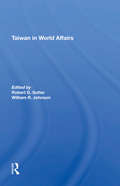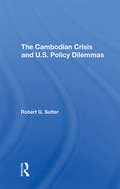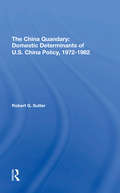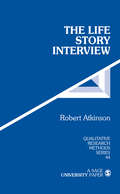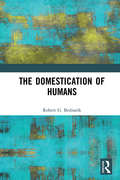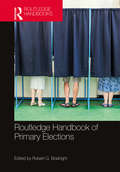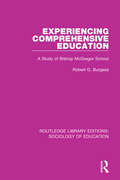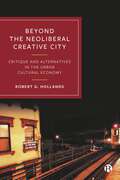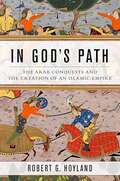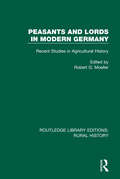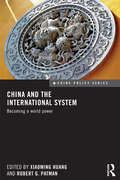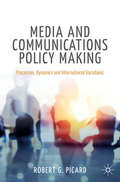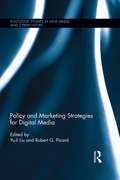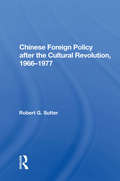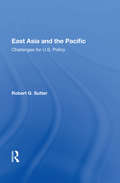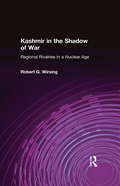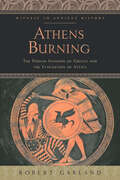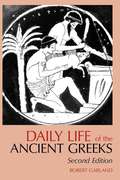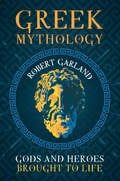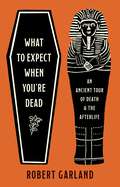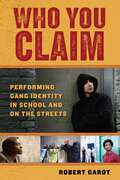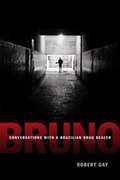- Table View
- List View
Taiwan In World Affairs
by Robert G Sutter William Oscar JohnsonTraditionally, Taiwan has been viewed as the passive pawn of more aggressive powers, yet now it has begun to assert its voice in world affairs—especially through economic influence. This volume brings together leading scholars to examine the origins and implications of Taiwan's global role and the ramifications of its growing strength for such crucial policy issues as China's reunification and U.S. policy in East Asia.
The Cambodian Crisis And U.s. Policy Dilemmas
by Robert G SutterThis book introduces the current U.S. policy issues and interests concerning the crisis in Cambodia. It provides an overview of the impasse in the Cambodian conflict that prevailed throughout much of the 1980s and looks at U.S. policy concerns in both Cambodia and Vietnam.
The China Quandary: Domestic Determinants Of U.s. China Policy, 1972-1982
by Robert G SutterThe American reconciliation with the People's Republic of China (PRC) begun by President Richard Nixon and developed by succeeding U.S. presidents has enjoyed wide support in the United States as one of the most important breakthroughs in U.S. foreign policy since the cold war. In broad terms, each American administration, from Richard Nixon's to Ronald Reagan's, has sought to use better relations with China as a means to position the United States favorably in the U.S.- Soviet-PRC triangular relationship; to stabilize Asian affairs, secure a balance of forces in the region favorable to the United States and its allies and friends, and foster a peaceful and prosperous future for Taiwan; to build beneficial economic, cultural, and other bilateral ties; and to work more closely with the PRC on issues of global importance such as world food supply, population control, and arms limitations. China has supported the opening of relations with the United States as a means to strengthen China's national security against the Soviet threat and to oppose the expansion of Soviet power in Asian and world affairs; to obtain U.S. and other Western economic commodities, investment, and technology; and to benefit from cultural, educational, and tourist exchanges.
The Life Story Interview
by Robert G. AtkinsonFirst-person narratives are a fundamental tool of the qualitative researcher. This volume provides specific suggestions and guidelines for preparing and executing a life story interview. Robert Atkinson places the life story interview into a wider research context before elaborating on planning and then conducting the interview. Finally, the book deals with the issues of transcribing and interpreting the interview. The author provides a sample life story interview in the appendix.
The Domestication of Humans
by Robert G. BednarikThe Domestication of Humans explains the alternative to the African Eve model by attributing human modernity, not to a speciation event in Africa, but to the unintended self-domestication of humans. This alternative account of human origins provides the reader with a comprehensive explanation of all features defining our species that is consistent with all the available evidence. These traits include, but are not limited to, massive neotenisation, numerous somatic changes, susceptibility to almost countless detrimental conditions and maladaptations, brain atrophy, loss of oestrus and thousands of genetic impairments. The teleological fantasy of replacement by a ‘superior’ species that has dominated the topic of modern human origins has never explained any of the many features that distinguish us from our robust ancestors. This book explains all of them in one consistent, elegant theory. It presents the most revolutionary proposal of human origins since Darwin. Although primarily intended for the academic market, this book is perfectly suitable for anyone interested in how and why we became the species that we are today.
Routledge Handbook of Primary Elections
by Robert G. BoatrightPrimary elections have been used for the past century for most U.S. elective offices and their popularity is growing in other nations as well. In some circumstances, primaries ensure that citizens have a say in elections and test the skills of candidates before they get to the general election. Yet primaries are often criticized for increasing the cost of elections, for producing ideologically extreme candidates, and for denying voters the opportunity to choose candidates whose appeal transcends partisanship. Few such arguments have, however, been rigorously tested. This innovative Handbook evaluates many of the claims, positive and negative, that have been made about primaries. It is organized into six sections, covering the origins of primary elections; primary voters; US presidential primaries; US subpresidential primaries; primaries in other parts of the world; and reform proposals. The Routledge Handbook of Primary Elections is an important research tool for scholars, a resource guide for students, and a source of ideas for those who seek to modify the electoral process.
Experiencing Comprehensive Education: A Study of Bishop McGregor School (Routledge Library Editions: Sociology Of Education Ser.)
by Robert G. BurgessIn this study, first published in 1983, Robert Burgess discusses the definitions, redefinitions, strategies and bargains used in and out of classrooms by teachers and pupils in a co-educational Roman Catholic school where he spent some time as a researcher and part-time teacher. He also looks at the role of the school’s headmaster, and his conception of the school, and at the house and departmental staff.This absorbing study will be of interest to teachers and students of sociology and education, practicing and prospective school teachers, researchers, administrators, policy makers and others who are concerned with schools and schooling.
Beyond the Neoliberal Creative City: Critique and Alternatives in the Urban Cultural Economy
by Robert G. HollandsA buoyant, creative economy can be seen as the saviour of many cities, but behind such ‘urban makeovers’ lie serious problems such as widening inequalities, job precarity, gentrification and environmental issues. In light of the pandemic and climate crisis, how well are city economies, based largely on culture, nightlife and tourism, meeting basic societal needs? Blending lively case studies of alternative cultural practices and spaces with broader theoretical debates, this book explores the opportunities for a more just and sustainable urban future.
In God's Path: The Arab Conquests And The Creation Of An Islamic Empire
by Robert G. HoylandIn just over a hundred years - from the death of Muhammad in 632 to the beginning of the Abbasid Caliphate in 750 - the followers of the Prophet swept across the whole of the Middle East, North Africa, and Spain. Their armies threatened states as far flung as the Franks in Western Europe and the Tang Empire in China. The conquered territory was larger than the Roman Empire at its greatest expansion, and it was claimed for the Arabs in roughly half the time. How this collection of Arabian tribes was able to engulf so many empires, states, and armies in such a short period has perplexed historians for centuries. Most accounts of the Arab invasions have been based almost solely on the early Muslim sources, which were composed centuries later to illustrate the divinely chosen status of the Arabs. Robert Hoyland's groundbreaking new history assimilates not only the rich biographical information of the early Muslim sources but also the many non-Arabic sources, contemporaneous or near-contemporaneous with the conquests. In God's Path begins with a broad picture of the Late Antique world prior to the Prophet's arrival, a world dominated by two superpowers: Byzantium and Sasanian Persia. In between these empires, emerged a distinct Arabian identity, which helped forge the inhabitants of western Arabia into a formidable fighting force. The Arabs are the principal actors in this drama yet, as Hoyland shows, the peoples along the edges of Byzantium and Persia - the Khazars, Bulgars, Avars, and Turks - all played critical roles in the remaking of the old world order. The new faith propagated by Muhammad and his successors made it possible for many of the conquered peoples to join the Arabs in creating the first Islamic Empire. Well-paced, comprehensive, and eminently readable, In God's Path presents a sweeping narrative of a transformational period in world history.
Peasants and Lords in Modern Germany: Recent Studies in Agricultural History (Routledge Library Editions: Rural History #11)
by Robert G. MoellerThis collection of essays, first published in 1986, provides an exciting introduction to modern German agrarian history. The essays offer a revised account of the agricultural sector in an industrial Germany, and provide an extensive methodological, conceptual and thematic range. This collection challenges accepted interpretations, suggests some alternatives and at the same time offers a context in which new questions can be posed and answers can be sought.
China and the International System: Becoming a World Power (China Policy Series)
by Xiaoming Huang Robert G. PatmanThis book considers the evolving relationship between China and the international system, and the interaction between a China of profound change in its identity, capability, and influence, and an international system that is itself experiencing a process of far-reaching transformation. It develops an analytical framework that allows us to capture, understand and explain a more dynamic pattern of agent-structure interaction in China’s relationship with the international system. By demonstrating a more dynamic and mutually constitutive relationship between China and the international system, the book explores the extent to which both transform themselves in the process, and provides a fuller and more effective assessment of the evolving nature of the relationship. In doing so, it addresses key issues in the current literature on the relationship of China and the international system, and helps close the gap in our knowledge of the conditions and consequences of change and stability in the international system as a result of the change in distributions of power, capability and influence among nation-states.
Media and Communications Policy Making: Processes, Dynamics and International Variations (Palgrave Global Media Policy and Business)
by Robert G. PicardThis textbook focuses on how media and communications policy is made and what influences its design. It explores the structures and processes in which policymaking takes place worldwide, the factors that determine its forms, influence its elements, and affect its outcomes. It explores how to analyze policy proposals, evaluate policy, and use policy studies approaches to examine policy and policymaking. Truly international in scope, it lays out the variety of political, social, economic, and institutional influences on policy, the roles of industries and policy advocates in the processes, and issues and factors that complicate effective policymaking and skew policy outcomes. This textbook is a valuable resource for advanced undergraduate and postgraduate students.
Policy and Marketing Strategies for Digital Media (Routledge Studies in New Media and Cyberculture)
by Robert G. Picard Yu-Li LiuWith digital media becoming ever more prevalent, it is essential to study policy and marketing strategies tailored to this new development. In this volume, contributors examine government policy for a range of media, including digital television, IPTV, mobile TV, and OTT TV. They also address marketing strategies that can harness the unique nature of digital media’s innovation, production design, and accessibility. They draw on case studies in Asia, North America, and Europe to offer best practices for both policy and marketing strategies.
Religion, National Identity, and Confessional Politics in Lebanon
by Robert G. RabilTracing the rise of Islamism in Lebanon and its attempt to Islamize society and state by the reverse integration of society and state into the project of Islamism, this book looks at Lebanonagainst a background of weak and contestednational identity and capricious interaction between religious affiliation and confessional politics, and attempts to illustrate in detailed analysis this "comprehensive" project of Islamism according to its ideological and practical evolutionary change. The author demonstrates that, despite ideological, political and confessional incongruities and concerns, Islamism, in both its Sunni and Shi'a variants, has maintained a unity of purpose in pursuing its project: "Jihad" against Israel and abolishment of political sectarianism. "
Chinese Foreign Policy/h
by Robert G. SutterChinese foreign policy has changed radically since the Cultural Revolution of 1966-1969. This book focuses on turning points in China's policy and looks at the influence of foreign pressures on China. It assesses the impact of internal political struggles on the conduct of Chinese foreign affairs.
East Asia And The Pacific: Challenges For U.s. Policy
by Robert G. SutterAs the cold war ends, the United States is being forced to reassess the dominant role it has played in East and Southeast Asia and the Pacific during the decades that followed World War II. Bringing readers up to date on policy trends in the area, the author provides a general overview as well as detailed analyses of key issues in individual nations and regions. The author concludes by placing these regional developments in the context of the ongoing debate in the United States over an appropriate foreign policy in the post-cold war world.
Kashmir in the Shadow of War: Regional Rivalries in a Nuclear Age
by Robert G. WirsingThis timely study examines the Indian-Pakistani conflict over Kashmir as this long-standing confrontation between regional rivals became inflamed. It focuses on the period from the effective nuclearization of the dispute in 1998 to the introduction of U.S. troops into the region in connection with the war in Afghanistan. Four chapters take on key problems illustrated by this case: Regional rivalry, Intervention, Religious conflicts, Conflict resolution. The author is an advocate of international intervention in regional conflicts and does not think that leaving the contesting parties to settle their dispute (a sort of benign neglect) is a responsible U.S. policy.
Athens Burning: The Persian Invasion of Greece and the Evacuation of Attica (Witness to Ancient History)
by Robert Garland“A fresh approach to the Greco-Persian wars focusing on Athens’s evacuation, Persian occupation, and rebuilding . . . [a] compelling book.” —John O. Hyland, Christopher Newport UniversityWinner of the Choice Outstanding Academic TitleBetween June 480 and August 479 BC, tens of thousands of Athenians evacuated, following King Xerxes’ victory at the Battle of Thermopylae. Abandoning their homes and ancestral tombs in the wake of the invading Persian army, they sought refuge abroad. During this difficult year of exile, the city of Athens was set on fire not once, but twice. In Athens Burning, Robert Garland explores the reasons behind the decision to abandon Attica, the peninsular region of Greece that includes Athens, while analyzing the consequences, both material and psychological, of the resulting invasion.Taking its inspiration from the sufferings of civilians, Athens Burning also works to dispel the image of the Persians as ruthless barbarians. Addressing questions that are largely ignored in other accounts of the conflict, including how the evacuation was organized and what kind of facilities were available to the refugees along the way, Garland demonstrates the relevance of ancient history to the contemporary world. This compelling story is especially resonant in a time when the news is filled with the suffering of nearly 5 million people driven by civil war from their homes in Syria. Aimed at students and scholars of ancient history, this highly accessible book will also fascinate anyone interested in the burgeoning fields of refugee and diaspora studies.“The fullest account of the Persian sack of Athens in September 480 and in June 479 BCE available in English.” —Canadian Journal of History
Daily Life of the Ancient Greeks
by Robert GarlandSignificantly expanded and updated in light of the most recent scholarship, the second edition of Garland's engaging introduction to ancient Greek society brings this world vividly to life--and, in doing so, explores the perspectives and morals of typical ancient Greek citizens across a wide range of societal levels. Food and drink, literacy, the plight of the elderly, the treatment of slaves, and many more aspects of daily life in ancient Greece also come into sharp focus. More than sixty illustrations are included, as are maps, a chronology, a glossary of Greek terms, and suggestions for further reading.
Greek Mythology: Gods and Heroes Brought to Life
by Robert GarlandThe timeless stories of Greek mythology come to life in these reimagined tales written in the voices of Zeus, Oedipus, Odysseus, and many others.Though the gods are featured prominently in Greek mythology, there is nothing sacred about it. Anyone is free to bring their own interpretation to these stories, just as Homer, Sophocles, and Euripides did centuries ago. In this volume, classicist and author Robert Garland presents nearly forty Greek legends as told by the characters themselves. Telling their stories from their own perspectives, the famous characters of Greek mythology—both gods and mortals—are given a chance to reflect on their lives and defend actions. Each story is accompanied by historical commentary, making Greek Mythology: Gods and Heroes Brought to Life an engaging and accessible way to enjoy these timeless tales.
Greek Mythology: Gods and Heroes Brought to Life
by Robert GarlandThe timeless stories of Greek mythology come to life in these reimagined tales written in the voices of Zeus, Oedipus, Odysseus, and many others.Though the gods are featured prominently in Greek mythology, there is nothing sacred about it. Anyone is free to bring their own interpretation to these stories, just as Homer, Sophocles, and Euripides did centuries ago. In this volume, classicist and author Robert Garland presents nearly forty Greek legends as told by the characters themselves. Telling their stories from their own perspectives, the famous characters of Greek mythology—both gods and mortals—are given a chance to reflect on their lives and defend actions. Each story is accompanied by historical commentary, making Greek Mythology: Gods and Heroes Brought to Life an engaging and accessible way to enjoy these timeless tales.
Roman Legends Brought to Life
by Robert GarlandThe legends of early Rome are among the most memorable of any in the world. They are also highly instructive. They taught generations of Romans about duty and obedience. Duty and obedience might not seem to amount to much these days, but it was precisely these virtues that made Rome great. The legends are not, however, merely self-congratulatory and they are rarely simple exercises in nationalist propaganda. On the contrary, many reveal their ancestors’ dark side, which they expose unflinchingly. As in the case of Greek mythology, there is no authorised version of any Roman legend. The legends survived because they reminded the Romans who they were, what modest beginnings they came from, how on many occasions their city nearly imploded, and what type of men and women shaped their story. Defeat, loss, failure. That’s where this story – the story of the boldest, most enduring, and most successful political experiment in human history – begins. It’s the story of how a band of refugees escaped from the ruins of a burning city and came to establish themselves hundreds of miles to the west in the land of Hesperia, the Western Land, the land where the sun declines, aka Italia. It’s the story of a people who by intermingling, compromise and sheer doggedness came to dominate first their region, then the whole of peninsula Italy, and finally the entire Mediterranean and beyond.
What to Expect When You're Dead: An Ancient Tour of Death and the Afterlife
by Robert GarlandAn entertaining and enlightening book about how ancient peoples dealt with death—and what we might learn from themA lively story of death, What to Expect When You&’re Dead explores the fascinating death-related beliefs and practices of a wide range of ancient cultures and traditions—Mesopotamian, Egyptian, Hindu, Jewish, Zoroastrian, Etruscan, Greek, Roman, Early Christian, and Islamic. By drawing on the latest scholarship on ancient archaeology, art, literature, and funerary inscriptions, Robert Garland invites readers to put themselves in the sandals of ancient peoples and to imagine their mental state moment by moment as they sought—in ways that turn out to be remarkably similar to ours—to assist the dead on their journey to the next world and to understand life&’s greatest mystery.What to Expect When You&’re Dead chronicles the ways ancient peoples answered questions such as: How to achieve a good death and afterlife? What&’s the best way to dispose of a body? Do the dead face a postmortem judgement—and where do they end up? Do the dead have bodies in the afterlife—and can they eat, drink, and have sex? And what can the living do to stay on good terms with the nonliving?Filled with intriguing stories and frequent humor, What to Expect When You&’re Dead will be a morbidly delicious treat for every reader alive.
Who You Claim: Performing Gang Identity in School and on the Streets (Alternative Criminology #3)
by Robert Garot2011 Honorable Mention for the American Sociological Association Community and Urban Section's Robert E. Park Book AwardThe color of clothing, the width of shoe laces, a pierced ear, certain brands of sneakers, the braiding of hair and many other features have long been seen as indicators of gang involvement. But it’s not just what is worn, it’s how: a hat tilted to the left or right, creases in pants, an ironed shirt not tucked in, baggy pants. For those who live in inner cities with a heavy gang presence, such highly stylized rules are not simply about fashion, but markers of "who you claim," that is, who one affiliates with, and how one wishes to be seen.In this carefully researched ethnographic account, Robert Garot provides rich descriptions and compelling stories to demonstrate that gang identity is a carefully coordinated performance with many nuanced rules of style and presentation, and that gangs, like any other group or institution, must be constantly performed into being. Garot spent four years in and around one inner city alternative school in Southern California, conducting interviews and hanging out with students, teachers, and administrators. He shows that these young people are not simply scary thugs who always have been and always will be violent criminals, but that they constantly modulate ways of talking, walking, dressing, writing graffiti, wearing make-up, and hiding or revealing tattoos as ways to play with markers of identity. They obscure, reveal, and provide contradictory signals on a continuum, moving into, through, and out of gang affiliations as they mature, drop out, or graduate. Who You Claim provides a rare look into young people’s understandings of the meanings and contexts in which the magic of such identity work is made manifest.
Bruno: Conversations with a Brazilian Drug Dealer
by Robert GayIn the 1980s a poor farmer's son from Recife, Brazil, joined the Brazilian navy and began selling cocaine. After his arrest in Rio de Janeiro he spent the next eight years in prison, where he joined the Comando Vermelho criminal faction and eventually became one of its leaders. Robert Gay tells this young man's dramatic and captivating story in Bruno. In his shockingly candid interviews with Gay, Bruno provides many insights into the criminal world in which he lived: details of day-to-day prison life; the inner workings of the Brazilian drug trade; the structure of criminal factions; and the complexities of the relationships and links between the prisons, drug trade, gangs, police, and favelas. And most stunningly, Bruno's story suggests that Brazilian mismanagement of the prison system directly led to the Comando Vermelho and other criminal factions' expansion into Rio's favelas, where their turf wars and battles with police have terrorized the city for over two decades.
